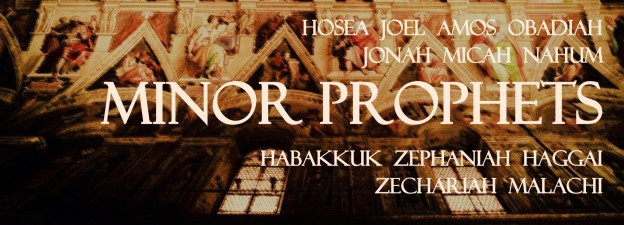"The Lord Roars from Zion" -- Amos 1:1-2
 Thursday, March 21, 2019 at 11:33AM
Thursday, March 21, 2019 at 11:33AM 
Sermons on the Minor Prophets: The Book of Amos (1)
"The Lord Roars from Zion,” “He has spoken against you the people of Israel,” “An adversary will bring you down,” “I will send you into exile,” “I will send a famine of the word upon the land,” and then “I will restore the fortunes of my people.” These are just some of the words of blessing and curse YHWH declares to his people through the Prophet Amos.
Whenever we take up the study of a new book of the Bible it is important to take the time to consider who wrote this book and when. We should also ask why the book was written, as well as identify the specific issues it addresses. Because the books of the Minor Prophets are God’s word, they speak powerfully to us today. But we are not the original audience. If we do not take the time to do ask and answer these questions, it becomes all too easy to use the ancient text as a springboard for any number of moralistic object lessons: “what does Amos teach us about how to be better people?” “Dare to be an Amos.” Or, we can turn his message into a political diatribe about the evils of wealth and materialism.
The latter is an especially strong temptation in the case of the Minor Prophets because they do speak truth to power. Yet unlike political figures seeking reform and change, these prophets speak God’s words to power in a particular redemptive-historical context, a context which we’ve spent the past few weeks working to establish. If we take up each of the books of the Minor Prophets without considering the background questions, “who?” “when?” and “why?” these books were written to the original audience, we risk falling into one of the previously mentioned misuses of the text, and then we likely miss the message these prophets bring to God’s people. We will briefly answer these questions and conduct a fly-over survey of the contents and issues raised in Amos’ prophecy.
Who was Amos? Like Elijah, Amos suddenly appears in Israel (the Northern Kingdom), during the reign of Jeroboam II, about 760 B.C. Jeroboam II is the twelfth king of Israel, taking the name of one of those from whom he descends, Jeroboam I. Jeroboam II’s reign is approximately 130 years after Jeroboam I, and nearly one hundred years after God sent Elijah to confront king Ahab and his successor, Ahaziah. Jeroboam II is likely the most successful of the kings of Israel. He defeated Israel’s nearest enemy (the Arameans–2 Kings 14:25-28) and extended his kingdom as far north as Damascus (in Syria). As a benefit of relative peace, Israel’s economy grew strong through international trade–making land owners wealthy, while their servants suffered terribly because of the demands of a greatly increasing harvest. The population of Israel had grown to more than 350,000, and archaeological evidence demonstrates significant olive oil and wine production during this time, even, perhaps horse breeding.
Israel’s spiritual heath in this period does not match its economic prosperity. YHWH was still officially worshiped at Israel’s chief ancient shrines at Dan (in the north) and Bethel (to the south). But it was also likely that such worship was tied to the use of statues and/or images of golden calves representing YHWH (as instituted by Jeroboam I). This practice becomes the subject of much of the prophetic activity in Israel, as YHWH sends forth his messengers to condemn all such idolatrous use of images throughout Israel and Judah. Those priests conducting services in Israel’s holy places continued to renounce Judah, Jerusalem, and the temple. Israel’s heart toward YHWH had grown increasingly cold and distant after the days of Elijah and Elisha. Many have come to believe their apostate form of Judaism is actually the true religion to be practiced by God’s people.
To read the rest of this sermon, Click Here


Reader Comments